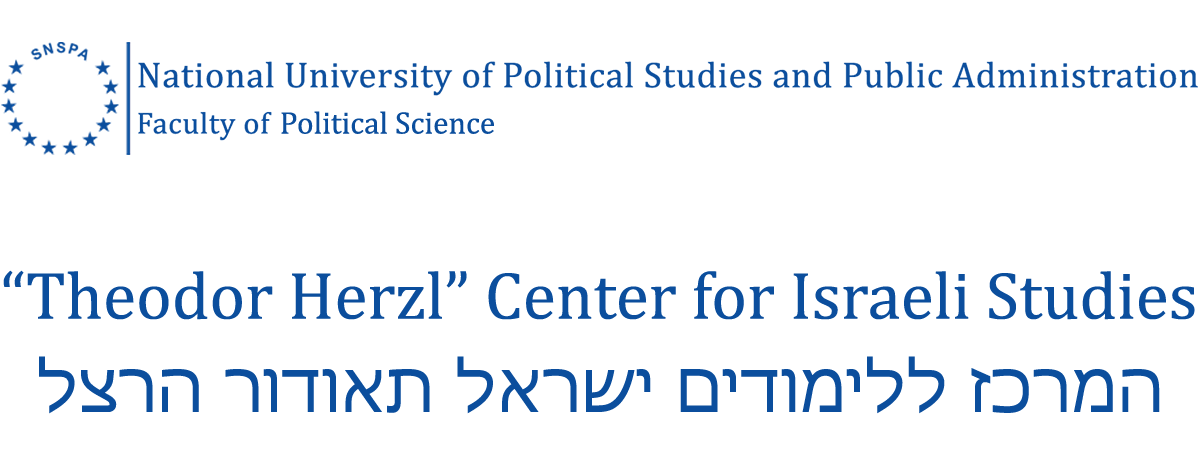The Strategy of the CSIs
The strategy of the "Theodor Herzl" Centre for Israeli Studies is based on the idea that Romanian youth, and potentially youth from the region (South East Europe), would greatly benefit from an educational and research-based institution located in a prestigious university like the National University of Political Studies and Public Administration. The aim of the Centre is to establish a Master's Programme in Israeli Studies together with a team of researchers in the area of Israeli and the Middle East.
One of the means of achieving our objectives is to partner with the relevant institutions. So far, the Centre achieved an excellent partnership with the Embassy of Israel in Bucharest, as well as with significant academic institutions from Romania (University of Bucharest) and Israel (Hebrew University in Jerusalem, Tel Aviv University, IDC Herzliya and Beit-Berl College). The Centre is also a member of the European Association for Israeli Studies.
The following activities and projects define in more concrete terms the Centre's strategy:
- Develop partnerships with public and private stakeholders, especially with universities and research institutions in Romania and abroad.
- Create an internationalized MA program in Israeli Studies, in partnership with Israeli universities such as Haifa University and Tel Aviv University.
- Train experts with high expertise in the field through its fellowship program.
- Provide expertise for elaborating strategies pertaining to the analyzed region.
- Edit scholarly publications as well as public policy documents and recommendations.
- Organize conferences and seminars with national and international participants.
- Join international professional associations which bring together centers for Israeli Studies or institutional bodies with adjacent objectives.
A New Academic Structure at the National University of Political Science and Public Administration (SNSPA)
The establishment of the Center of Israeli Studies within NUPSPA as a teaching and research structure requires some clarifications and explanations. In the contemporary academic world, there is an ever-growing trend towards a deeper knowledge of various areas of world civilization, towards deepening the information on their spiritual anatomy, political structures, and economic interests. The development and diversification of regional studies, as an expression of this trend, is a relevant phenomenon connected to university life. Grasping different realities enriches knowledge and facilitates the understanding of highly complex phenomena. In this sense, it is worthwhile mentioning the emergence of American Studies, East-Asian Studies, Mediterranean Studies, etc. The very concept - which is quite wide - of European Studies, in a continuous expansion, is the expression of the dynamics pertaining to regional studies. This is the context in which the new academic structure of Israeli studies was created.
In an institution of education for government such as the National University of Political Science and Public Administration, broadening the knowledge of various forms of political organization can only be beneficial. CSIs fit into the category of regional centers and study programs that meet the intellectual interests of the students and emphasizes, once more, the variety of political realities.
As far as the connection to Jewish studies is concerned, there are many common features. For example, one cannot ignore specific issues pertaining to the history of the Jewish people. Modern Hebrew, for example, will be studied. We shall also be very interested in studying political life as part of Jewish history, especially in analyzing a very innovative self-governing structure:
The Community (Kehillah) functioned as a “replacement of the state”, its function being to manage everyday life. We cannot ignore the fact that certain expertise in Jewish studies influences the ones who dedicate their time to Israeli studies and facilitates their endeavors. As far as Middle East studies are concerned,
they provide a better knowledge of the geo-political situation in the area, with a substantial impact on knowing the geopolitical framework of various Israeli issues, not
only external relations and security policies but also economic, social, and domestic policies. Despite being geographically placed outside of Europe, Israeli studies are strongly connected to European studies. Born as a result of the success of a specific European political project - the Zionist project - Israel was and is deeply connected to the political and economic developments of Europe.
The Center of Israeli Studies within the National University of Political Science and Public Administration, according to its profile, is meant to train experts in the extremely complex problems faced by Israel, so that government bodies, businesses, non-governmental organizations, and the media may employ them. To achieve this purpose, we want to develop a teaching structure, and a Master's Programme, and organize regular academic meetings so as to discuss a number of issues faced by the Israeli society. In parallel to training specialists, together with other academic institutions in Romania and abroad, the Center also intends to pursue research in the field.
